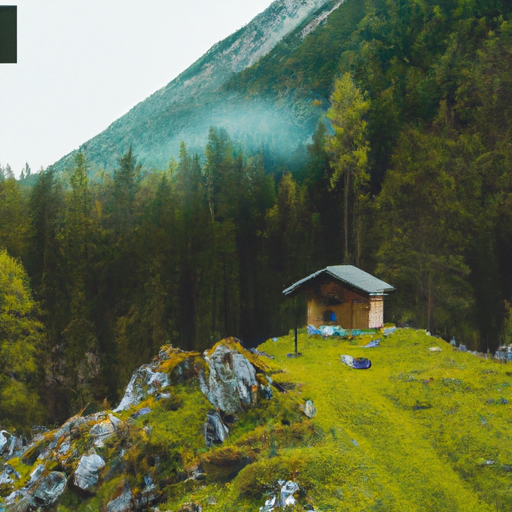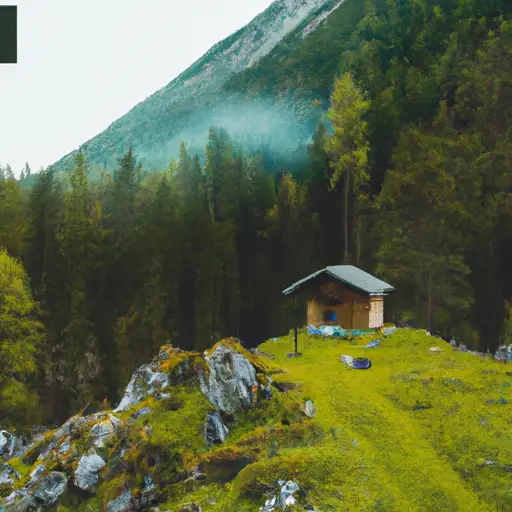So, picture this: you’re sitting in your cozy living room, surrounded by the quiet hum of nature, with no intrusive sounds of city life to disturb your peace. You’re completely self-sufficient, generating your own energy, growing your own food, and living life on your own terms. Sounds idyllic, right? Well, for a growing number of individuals, this is not just a fantasy, but a deliberate and conscious lifestyle choice. In this article, I’ll explore the reasons why people decide to leave behind the hustle and bustle of modern society and opt for an off-grid lifestyle.

Financial Independence
Living off-grid offers the potential for reduced or even eliminated bills, which is a major draw for many individuals seeking financial independence. By embracing a self-sufficient lifestyle, individuals can drastically reduce their monthly expenses. For example, generating their own electricity through solar panels or wind turbines eliminates the need to pay for traditional utility services. Additionally, collecting rainwater and implementing efficient water management systems can significantly reduce or eliminate the need for municipal water services.
By implementing these practices, individuals can decrease their reliance on the conventional economy and take control of their financial destiny. The money that would have been allocated to bills can be redirected towards other financial goals, such as savings, investments, or pursuing personal passions. This newfound financial stability provides individuals with a sense of security and the freedom to make choices based on their own values and aspirations.
Environmental Concerns
Living off-grid not only brings financial benefits but also greatly reduces one’s carbon footprint. By disconnecting from the conventional power grid and generating renewable energy, individuals can minimize their impact on the environment. Renewable energy sources like solar and wind power produce clean energy, helping to combat climate change and reduce dependence on fossil fuels.
Furthermore, off-grid living promotes the preservation of natural resources. By relying on self-sustaining practices such as composting, rainwater harvesting, and responsible waste management, individuals can minimize their waste output and reduce their overall environmental impact. This commitment to sustainable living helps protect ecosystems and preserve natural resources for future generations.
Self-sustainability
One of the key aspects of off-grid living is self-sustainability. This involves producing one’s own food, managing water resources, and generating energy without relying on external sources. By growing their own fruits, vegetables, and herbs, individuals can have a direct impact on their food security and quality. The satisfaction of harvesting and consuming homegrown produce is unparalleled, fostering a closer connection to nature and nourishing the body with fresh, organic sustenance.
Water management is another critical aspect of self-sustainability. Implementing methods such as rainwater harvesting, water conservation practices, and responsible use of natural water sources allows individuals to have full control over their water supply. By reducing reliance on municipal water systems, individuals become less vulnerable to water shortages and price fluctuations.
Adopting renewable energy sources, such as solar panels or wind turbines, allows individuals to generate their own power. This not only reduces the dependence on fossil fuels but also provides a reliable source of energy even in remote locations. The surplus energy generated can be stored in batteries, ensuring a constant power supply throughout the day and night.
Escape from Modern Society
For some individuals, the decision to live off-grid stems from a deep-rooted desire for simplicity and a longing to disconnect from the fast-paced and technology-driven modern society. Living off-grid offers an opportunity to step away from the relentless demands of technology, reclaiming peace and solitude in one’s life. Without the constant noise and distractions of modern life, individuals can embrace a slower pace, introspection, and the simplicity of living harmoniously with nature.
Health and Well-being
Living off-grid can have a profound impact on one’s health and well-being. Surrounding oneself with cleaner air and water is a crucial aspect of off-grid living. By being away from heavily urbanized areas and industrial pollution, individuals can enjoy fresher air and a healthier environment. Similarly, managing their water sources ensures access to clean, unpolluted water, promoting better overall health.
Engaging in physical activity and outdoor living is an inherent part of off-grid life. Whether it’s tending to a garden, chopping firewood, or exploring vast acres of land, off-grid living encourages individuals to lead an active lifestyle. Regular physical activity not only improves overall fitness but also boosts mental health, reduces stress, and increases mental clarity.
Speaking of mental well-being, embracing an off-grid lifestyle can provide individuals with much-needed respite from the pressures and stresses of modern life. Disconnecting from technology and immersing oneself in nature allows for introspection, self-reflection, and a deeper connection with the natural world. This sense of peace and clarity can lead to reduced stress levels, improved mental health, and a greater sense of overall well-being.
Greater Personal Freedom
Living off-grid offers greater personal freedom, free from restrictions, regulations, and the pervasive influence of mainstream society. Without being tied to the conventional systems and societal expectations, individuals can prioritize their own values and make choices that align with their personal convictions.
A significant aspect of this personal freedom is the right to privacy and autonomy. Off-grid living allows individuals to create their own haven, away from prying eyes and the encroachment of modern society. Whether it’s a secluded cabin nestled in the woods or a self-sustaining homestead in a remote location, living off-grid offers privacy and the freedom to live by one’s own rules.
Embracing a Sustainable Lifestyle
Living off-grid inherently promotes and inspires sustainable practices. By embracing self-sufficiency and minimizing reliance on external resources, individuals demonstrate a commitment to living in harmony with nature. This commitment often extends beyond one’s own lifestyle choices, with many off-gridders advocating for sustainable practices and inspiring others to do the same.
Disillusionment with Mainstream Society
For some individuals, the decision to live off-grid is a result of discontent with consumerism and a lack of trust in mainstream institutions. Many people feel suffocated by the constant pursuit of material possessions, and the off-grid lifestyle provides an alternative to this consumer-driven society. By disconnecting from the mainstream and embracing self-sufficiency, individuals can detach from consumeristic pressure and pursue a more meaningful existence.
Preparing for Emergencies
Living off-grid provides individuals with a level of self-reliance and preparedness, especially during times of natural disasters or crises. By having the necessary resources and skills to sustain themselves, off-gridders can mitigate the effects of emergencies and reduce their vulnerability. Access to food production, water, and renewable energy sources enables individuals to maintain a sense of security and protection when external systems may fail.
Sense of Adventure and Exploration
Living off-grid is often fueled by a desire for adventure, exploration, and a willingness to step outside the boundaries of societal norms. By choosing to live on the edge and explore uncharted territories, individuals can satisfy a longing for new experiences and a deep connection with the natural world. Off-grid living allows individuals to forge their own path, discovering the beauty and wonder of nature in its rawest form.
In conclusion, the decision to live off-grid is multifaceted and deeply personal. It offers financial independence, reduces one’s environmental footprint, promotes self-sustainability, provides an escape from modern society, enhances health and well-being, grants greater personal freedom, inspires sustainable living, challenges mainstream societal norms, prepares for emergencies, and satisfies a sense of adventure. By embracing this alternative lifestyle, individuals can create a fulfilling and meaningful existence, living in harmony with nature and inspiring others to do the same.




